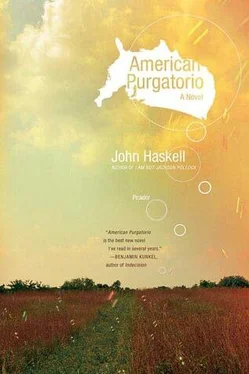John Haskell - American Purgatorio
Здесь есть возможность читать онлайн «John Haskell - American Purgatorio» весь текст электронной книги совершенно бесплатно (целиком полную версию без сокращений). В некоторых случаях можно слушать аудио, скачать через торрент в формате fb2 и присутствует краткое содержание. Год выпуска: 2006, Издательство: Picador, Жанр: Современная проза, на английском языке. Описание произведения, (предисловие) а так же отзывы посетителей доступны на портале библиотеки ЛибКат.
- Название:American Purgatorio
- Автор:
- Издательство:Picador
- Жанр:
- Год:2006
- ISBN:нет данных
- Рейтинг книги:3 / 5. Голосов: 1
-
Избранное:Добавить в избранное
- Отзывы:
-
Ваша оценка:
- 60
- 1
- 2
- 3
- 4
- 5
American Purgatorio: краткое содержание, описание и аннотация
Предлагаем к чтению аннотацию, описание, краткое содержание или предисловие (зависит от того, что написал сам автор книги «American Purgatorio»). Если вы не нашли необходимую информацию о книге — напишите в комментариях, мы постараемся отыскать её.
Los Angeles Times
American Purgatorio — читать онлайн бесплатно полную книгу (весь текст) целиком
Ниже представлен текст книги, разбитый по страницам. Система сохранения места последней прочитанной страницы, позволяет с удобством читать онлайн бесплатно книгу «American Purgatorio», без необходимости каждый раз заново искать на чём Вы остановились. Поставьте закладку, и сможете в любой момент перейти на страницу, на которой закончили чтение.
Интервал:
Закладка:
I didn’t think of Anne because Anne was gone. I was thinking of the girl who wasn’t Anne.
My favorite expression during my time with Polino was “Fuck it.” When something presented itself I would just, with my newfound habit, say Fuck it. Meaning just treat everything as something not to care about. To want nothing else. To hate who I was. Fuck my body and my hair and my teeth, and also my desires. Especially fuck them. But now they were fucking me. I could feel them coming to life in my body, and I mentioned before about how desire turns into hope which turns into anticipation, and for me, anticipation had become a force, like a thing at the end of a rope, pulling, and I could feel myself being pulled, through the membrane that separated me from hope, pulling me out of Polino’s world and into something else.
That something else was the view of Linda’s house.
I walked past the house several times on the sidewalk, like a pedestrian, casually sneaking looks in the curtained window. I stood across the street, under the weeping branches of a willow tree, silently watching, like an Indian, for her to emerge. And waiting. And as I waited I imagined her, which kept me waiting. When she appeared, watering the terra-cotta pots on the front steps, I felt in my body a longing. Not necessarily for her but for something that I wanted. I wanted it with the excruciating want of a child wanting, and what was excruciating was my belief in the impossibility of even getting near it. It was in my heart, this thing that I wanted so much, and what was in my heart was love.
There was the fact that I loved Anne. Which I still did. And she loved me. She had and she did. Love had definitely existed, and I was happy in that love. I was happy to love, and also happy to be loved by her. Although she was gone, my need or my habit or my desire for her still existed.
And you might say, “That’s over.” You might say, “Move on and find someone else to love.” And that would be the correct prescription. Get on with your life, Jack. And it’s easy to say that, but for me it wasn’t so easy. I didn’t want to move on. I didn’t want to replace my love. And anyway, I didn’t see how I could. Where would the old love go? Into memory? I had plenty of memories already. I didn’t need more memories. I needed Anne. I loved her and she’s dead and I know she’s dead but I can’t just turn around, see someone new, and love that new person. And yes, I might like to be loved again, who wouldn’t? But I want Anne’s love. That’s the love I got used to, and having got used to it, I want it back.
Standing there, watching Linda, I start to imagine, in my mind, not a perfect person, because I don’t need perfection anymore. I’m not perfect, but I want a person to give my love to. As if something inside me needs to leave my body and find an object outside my body. As I stare at the purple bougainvillea vine blooming over the door, more than seeing any one specific person, I imagine a generalized person, a woman. I conceive of a love for her. I imagine her imperfections and it’s those imperfections that I see myself loving. And she, in my dreams, is willing to return my love. My fantasies, as I run them through my mind, over and over, become, not quite reality, but something I can live for.
6
I’m excited about the prospect of … what? I don’t know exactly, excited more by the emergence of desire than the possibility of that desire getting rewarded. I go back to the bunker where I live, find Polino spreading out his blanket, and because Polino is, at the moment, my best friend, I share my excitement.
I tell him about Linda, and about Geoff and Kentucky, but Polino has already heard about Anne, and this new girl, whoever she is, means nothing to him. He changes the subject, starts discoursing to me about the Donner Party, the people who crossed the Sierra Nevada, or tried to, but bad planning or unexpected weather forced them to stay the winter and starve. Or, if not starve, to eat their fellow travelers. He’s going on about the winter of 1847 and partly I’m listening to the lecture and partly I’m thinking about the lecturer.
Polino is wiry and energetic, and it’s not that he doesn’t have ambition. I’ve noticed that in his choice of words, although there are the requisite catch phrases of the day, he also likes to experiment with words he doesn’t know, or wants to know. The two books in his box are a ragged copy of Hamlet and a badly torn dictionary. Really half a dictionary — only the letters M through Z — and in the middle of his explanation of old-time cannibalism, as he describes the state of mind of the hungry families, he uses the word “lachrymosity.” And he stops in the middle of his speech. He’s not sure the word exists, and of course in his tattered dictionary the word isn’t there, and the fact that the definition of the word, if it is a word, is unknown to him increases his belief that knowing its meaning would change things.
So he’s frustrated, and in his frustration looks around and sees me, sitting against the cinder-block wall, and he suddenly says to me, “This is my house, you know.”
“I know,” I say. “I appreciate your hospitality.”
“Hospitality?”
I can see what he wants is a little recognition. Although he’s living a life of indolence he still has some flickering desire. He too wants to be seen, and although he’s not willing to admit it, or do anything to bring it about, he’s tired of the free and easy life of romance, which for him lacks any actual romance.
I’m not blind to his dissatisfaction. Although it’s directed at me, I see it as stemming from something else, and I believe I can change that dissatisfaction. I’m feeling the anticipation of making contact with Linda and I want to pass on that feeling of anticipation. Having found a way out of my own tar pit, I want to pull Polino out. So I come up with a plan.
And the first thing I need to implement this plan is a goal. Sex is a good one, I think, so first comes the pep talk, a motivational sermon to get Polino going. I begin coaxing Polino into describing the girl he’s been talking about, a blond beachcomber girl he’s seen strolling along the beach. The thought of this girl gets him over his resistance.
That’s the first step.
The second step is getting cleaned up.
I take off my pants and shirt, get Polino to do the same, and then, in my underwear, I wash the clothes in a public shower by the beach. Using some soap that had fallen into the drain, I scrub and rinse and wash, first our clothes, then my body and my hair and my face. Polino leaves his beard alone, but with an abandoned disposable razor, I cut the incipient stubble off my face.
Wearing only our underwear, we set our clothes out on the rim of a trash can to dry. People are watching us but we don’t care, and partially we don’t care, or at least I don’t care, because I feel different now that I’m clean, or cleaner, and I believe Polino feels the same.
Grudgingly, he admits that he does. He begins to engage himself with the world of possibility, and the next step would be a haircut, but because I can’t find any scissors or comb we brush our hair back with our fingers.
And then comes finding the girl. Which would be simple enough except that Polino, having lived so long as a hermit, has lost his confidence. He’s lost belief in himself, in his own likability. But we’ve come this far, together, and so with our clothes dried, our hair combed, we go out into the world. We stand in front of a bar on Garnet Avenue and what we need, or what Polino says he needs, is a beer. But for that we need more money, so instead we buy a can of beer from a store and take up our position near the lifeguard station.
Читать дальшеИнтервал:
Закладка:
Похожие книги на «American Purgatorio»
Представляем Вашему вниманию похожие книги на «American Purgatorio» списком для выбора. Мы отобрали схожую по названию и смыслу литературу в надежде предоставить читателям больше вариантов отыскать новые, интересные, ещё непрочитанные произведения.
Обсуждение, отзывы о книге «American Purgatorio» и просто собственные мнения читателей. Оставьте ваши комментарии, напишите, что Вы думаете о произведении, его смысле или главных героях. Укажите что конкретно понравилось, а что нет, и почему Вы так считаете.











